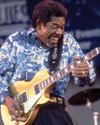
I am quietly confident that the Gibson guitar company would have sold considerably fewer examples of the Lester William Polsfuss Custom model had the gentleman not had the good sense to Americanise his moniker for professional purposes. But back in the Boring Twenties in Waukesha, Wisconsin, the putative inventor, innovator, and genius had come to a conspiratorial arrangement with his teenage chum. He had attached a cord to the bedpost and dangled it from the window every evening. If anything interesting was happening guitar-wise at the solitary local club, his accomplice was instructed to run over to the house and give the Yank a yank. (Sorry. It had to be done.)
And as Mr. Paul later recounted, it came to pass that he was woken one night by this crude method, accompanied by a stage whispered “Pssst! You gotta come! There’s a guy in town playing past the third fret!” “No way! No one does that!” Nevertheless, an incredulous 13-year-old Lester shimmied down the drainpipe, and a few minutes later was watching transfixed as his mentor-to-be and future employer, Joe Wolverton, did imaginable things on a guitar. The rest is a mystery. The stage, radio and recording career, the guitar designs, the overdubbing, tape delay, phasing and multitracking. You couldn’t make it up. But Les Paul did.
This story is from the {{IssueName}} edition of {{MagazineName}}.
Start your 7-day Magzter GOLD free trial to access thousands of curated premium stories, and 9,000+ magazines and newspapers.
Already a subscriber ? Sign In
This story is from the {{IssueName}} edition of {{MagazineName}}.
Start your 7-day Magzter GOLD free trial to access thousands of curated premium stories, and 9,000+ magazines and newspapers.
Already a subscriber? Sign In

THE MOODY BLUES
This month Stuart Ryan delves into the picking style of this British prog legend whose acoustic guitar has powered many a Moody Blues song.

WAYNE KRANTZ
This issue Nick Mellor provides an insight into this brilliant jazz stylist, focusing on his approach to improvising over static chords.

OPEN G TUNING
Open tunings are great fun and can help create exciting new ideas. Simon Barnard shows how to incorporate open G tuning into your playing.

RODRIGO GOUVEIA
Last month we featured Mateus Asato, and mentioned the importance of the neo-soul style in his playing. Here we turn to his fellow Brazilian, the master of neo-soul fusion.

MARK KNOPFLER
Our topic this month is a master craftsman as both guitar player and songwriter. His style is unique and his influence spreads far and wide.

U2
Martin Cooper checks out the chiming pedal delay tones of this stadium-filling band from Dublin, Ireland, and guitarist The Edge.

LUTHER ALLISON
It’s blues with a touch of soul this month, as David Gerrish explores the dynamic, expressive style of an often overlooked Chicago bluesman.

JOHANN KASPAR MERTZ Capriccio
This month Declan Zapala explores the music of Austria at the turn of the Romantic period with a fiery caprice to level up your fingers and unlock your inner virtuoso.

THE CROSSROADS Michael Landau
John Wheatcroft explores the playing of a session ace _ and blazing blues-rock maestro who graces the top-flight m band of singer-songwriting legend, James Taylor.

VIDEO MASTERCLASS Troy Redfern
This month GT welcomes this slide guitar virtuoso. If you've been wanting to take your slide playing to the next level then this is one's for you. With Jon Bishop.